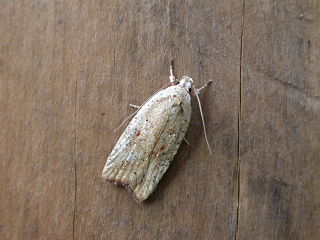
The gorse tip moth is a smallish moth species of the family Depressariidae.

Coleophora trochilella is a moth of the family Coleophoridae. It is found in all of Europe, with possible exception of parts of the Balkan Peninsula.

Depressaria is a genus of moths in the superfamily Gelechioidea. It is the type genus of subfamily Depressariinae, which is often – particularly in older treatments – considered a distinct family Depressariidae or included in the Elachistidae, but actually seems to belong in the Oecophoridae.
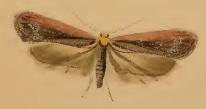
Blunt’s flat-body or purple carrot-seed moth is a moth of the family Depressariidae. It is found in most of Europe. It is also found in the Near East, North Africa, the eastern part of the Palearctic realm and since 2009 in North America. In the former USSR, it is distributed in the entire European part except for the Far North. It is also found in the northern Caucasus and Transcaucasia, in Kazakhstan, Central Asia, the south of Siberia, and the Russian Far East. It is an introduced species in North America, where it has been reported from Québec and Ontario.

Depressaria emeritella is a moth of the family Depressariidae. It is found in most of Europe. It is also found in the Near East and the eastern part of the Palearctic realm.

Depressaria chaerophylli is a moth of the family Depressariidae.

Depressaria libanotidella is a moth of the family Depressariidae. It is found in most of Europe, except Great Britain, Ireland, the Benelux, Portugal, Norway, Poland, most of the Balkan Peninsula and most of the Baltic region.
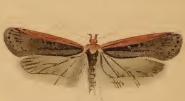
Depressaria pimpinellae is a moth of the family Depressariidae. It is found in most of Europe, except Ireland, Portugal and most of the Balkan Peninsula.

Depressaria daucella is a moth of the family Depressariidae. It is found in most of Europe, except most of the Balkan Peninsula. It is also found in North America.

Depressaria silesiaca is a moth of the family Depressariidae. It is found in Great Britain, Fennoscandia, Estonia, Latvia, Russia, Poland, the Czech Republic, Austria, Switzerland and Italy.
Depressaria adustatella is a moth of the family Depressariidae. It is found in France and on the Iberian Peninsula and Sardinia. It is also present in North Africa, where it has been recorded from Morocco, Algeria and Libya.

Depressaria artemisiae is a moth of the family Depressariidae. It is found in most of Europe, except Ireland, Great Britain, the Netherlands, Belgium, the Iberian Peninsula and most of the Balkan Peninsula. It is also found in North America.

Depressaria badiella is a moth of the family Depressariidae. It is found in most of Europe, Libya, the Caucasus and Mongolia.
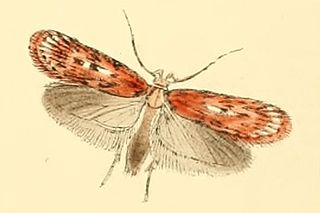
Depressaria pulcherrimella is a moth of the family Depressariidae. It is found in most of Europe, except the Balkan Peninsula.

Depressaria ultimella is a moth of the family Depressariidae. It is found in most of Europe, except Spain, Norway, Finland, Lithuania, Switzerland, Italy and most of the Balkan Peninsula.

Depressaria sordidatella is a moth of the family Depressariidae. It is found in most of Europe, except Ireland, Portugal, Belgium, Ukraine and most of the Balkan Peninsula.

The parsnip moth or parsnip webworm is a moth of the family Depressariidae. It is found in most of Europe, except Portugal and most of the Balkan Peninsula. This species has also been introduced into New Zealand.

Phycitodes maritima is a species of snout moth. It is found in most of Europe.
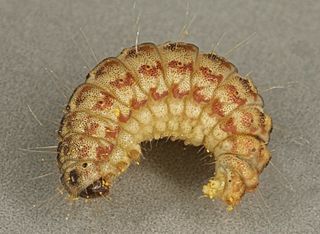
Phycitodes saxicola, the small clouded knot-horn, is a species of snout moth described by Vaughan in 1870. It is found in most of Europe, as well as Iran, Morocco and the Canary Islands.
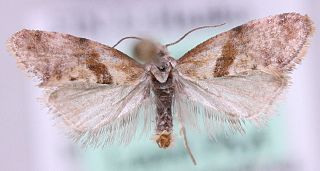
Cochylidia implicitana, the chamomile conch, is a moth of the family Tortricidae. It was described by Wocke in 1856. It is found in most of Europe, except Ireland and most of the Balkan Peninsula. Outside of Europe, it is found in Morocco, the Alatau mountains in Central Asia, Iran and China (Xinjiang). The habitat consists of waste ground and verges.















